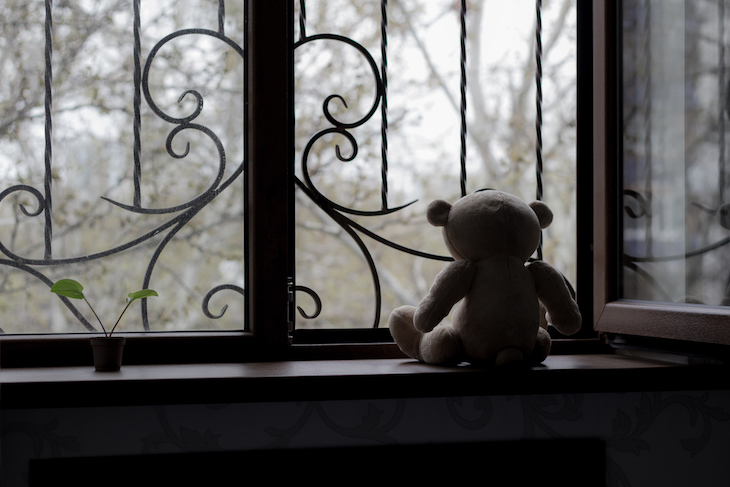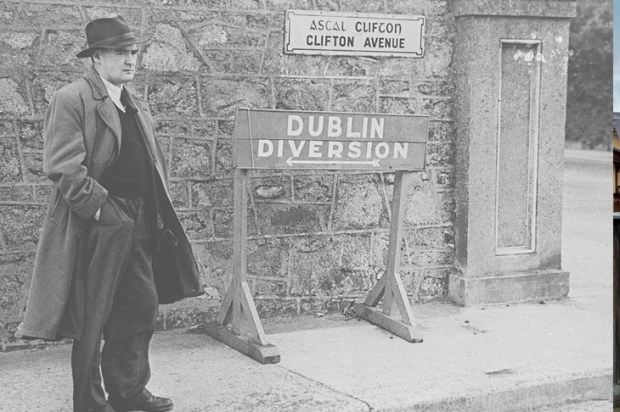Sofka Zinovieff’s new novel, Putney, is an involving, beautifully written, and subtle account of an affair in the 1970s between Ralph, a composer in his thirties, and Daphne, a young girl, who is nine when she is first encountered: ‘Flitting, animal movements; narrowed, knowing eyes; dark, tangled hair; dirty bare feet.’ Enchanted by this creature, whom he idealises as a kind of embodiment of the free spirit of the age, he convinces himself, though he has never felt love for a child before, that this is a new, powerful and pure thing — ‘the beginnings of love’ — and grooms her, kissing her under a tree when she reaches the age of 12, before embarking on a full blown affair.
He even takes her on holiday with him to Greece — an act which later times would term an abduction. Daphne’s father, Edmund, is a laissez-faire Putney novelist whose house is full of the students he sleeps with; her mother is a Greek who spends more time on political protests and seeing her lover than looking after her child, who is largely left to her own devices. It was the 1970s, says Ralph; things were different then.
What follows is an incredibly unnerving account of abuse and its consequences, told through three perspectives. Ralph, looking back on his successful life from his cancerous old age, remembers the ways in which he — in his eyes — seduced Daphne: the presents, the ‘little secrets’, the whole revolting arsenal of a grooming paedophile. There are many horrible contrasts: the adult man sleeping with a little girl in her bedroom, driving her around in cars, writing to her and blinding her with his power. Daphne believes she was truly in love with him; despite the fact that her adult life was a mess, she is unconvinced that Ralph had anything to do with it. She thinks she emerged ‘unscathed’ from the whole experience, and even makes a wall hanging, called ‘Putney’, in which she places beautiful images of herself and Ralph during their affair.
Her own daughter is entering puberty, and she watches her with trepidation as she dresses up in short skirts to go out to parties. It’s only then that she starts to wonder about the true implications of what happened to her. When a friend, Jane, whom she has known since childhood, and who knew about Ralph, tells her about historic sexual abuse, she brings charges. Jane acts as a Greek chorus: furious and avenging, she pushes Daphne onwards, though, as it turns out, she has her own reasons for acting in this way.
There are terribly difficult questions here, dealt with sensitively and intelligently. Did Daphne really love Ralph? Could Ralph’s behaviour have been in any way excusable? Should the full might of the law be brought against a dying man? Ralph’s self-justifications ring hollow: ‘She inspired me. I felt like a child next to her. I felt free. But I was also as captive as the lowest slave with an Egyptian princess. She couldn’t have known what I was feeling but I wanted to lie down before her and let her walk on me.’ He even refers knowingly to Lolita: ‘I wasn’t some Humbert Humbert obsessed with nymphets.’ If you say so, Ralph.
The world of the 1970s comes fully alive: the parties, the loucheness, the neglect masquerading as freedom; and the scenes in Greece are pungent and dangerous. The wheel of fate is put into motion. Things are not quite as simple, though, and Zinovieff allows for an ambiguity in Daphne and Ralph’s relationship even as she pursues him. There is a peculiarly affecting moment where Ralph, in the midst of the accusations, goes to Edmund’s birthday party, where he faces up to Daphne, still unable to believe that he has done anything wrong. There is something a little Lear-like about this fallen king; only, of course, we think he deserves it.
Putney is a novel about abuse; but also about narrative, and who controls it. Whose version is correct? Daphne, who continues to see Ralph through rose-tinted lenses? Ralph? Surely not. Or Jane, Daphne’s gawky teenage friend, who longed for similar experiences? In the end, a monster is a monster, even if he makes beautiful music.
Got something to add? Join the discussion and comment below.
Get 10 issues for just $10
Subscribe to The Spectator Australia today for the next 10 magazine issues, plus full online access, for just $10.
You might disagree with half of it, but you’ll enjoy reading all of it. Try your first month for free, then just $2 a week for the remainder of your first year.














Comments
Don't miss out
Join the conversation with other Spectator Australia readers. Subscribe to leave a comment.
SUBSCRIBEAlready a subscriber? Log in